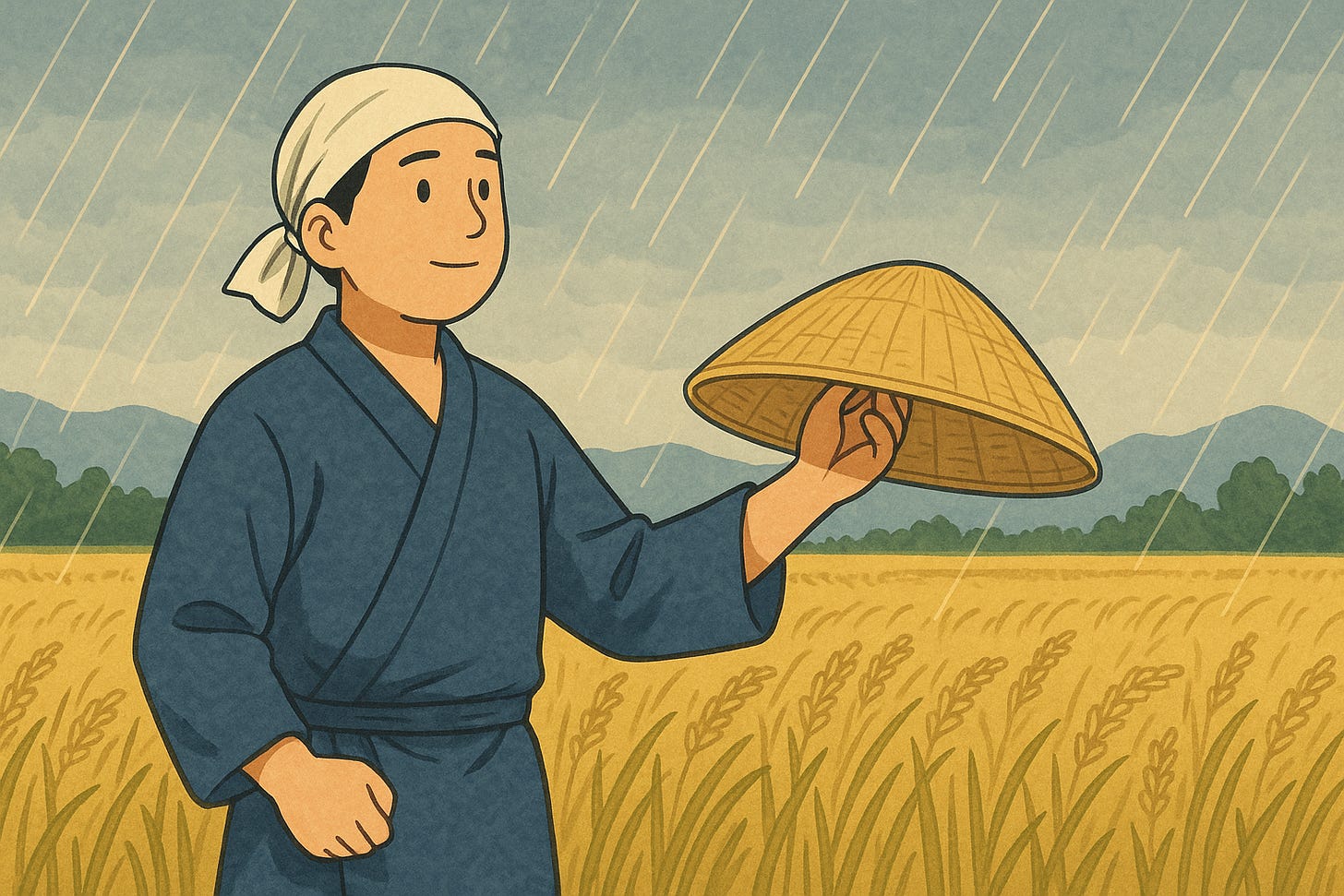A Poem Found After Death: Kenji Miyazawa’s Wish to Help Others
A Bilingual Version with Simple Japanese and English Translation
宮沢賢治(みやざわ けんじ)の 有名(ゆうめい)な 詩(し)を やさしい日本語(にほんご)にして、英語(えいご)の訳(やく)も つけました。
I rewrote a famous poem by Kenji Miyazawa in easy Japanese and added an English translation.
雨(あめ)が ふっても まけない。
Even when it rains, I don’t give up.
風(かぜ)が ふいても まけない。
Even when the wind blows, I don’t give up.
雪(ゆき)が ふっても 暑(あつ)い日(ひ)でも まけない。
Even in snow or on hot days, I don’t give up.
じょうぶな 体(からだ)を もち、
I have a strong and healthy body,
物(もの)を あまり ほしがらず、
I don’t want too many things,
けっして おこらず、
I never get angry,
いつも 静(しず)かに わらっている。
And I always smile quietly.
一日(いちにち)に 玄米(げんまい)を 四合(しごう)と、
I eat about 720ml of brown rice each day,
みそと すこしの 野菜(やさい)を 食(た)べる。
With some miso and a few vegetables.
なんでも よく 見(み)て、
I watch everything carefully,
よく 聞(き)いて、
Listen well,
そして わすれない。
And I don’t forget.
田(た)んぼの 松(まつ)の林(はやし)の かげの、
I live in a small house,
小(ちい)さな 草(くさ)の 屋根(やね)の 小屋(こや)に いる。
Under the pine trees, near the rice fields, with a grass roof.
東(ひがし)に 病気(びょうき)の 子(こ)が いれば、
If there’s a sick child in the east,
行(い)って 看病(かんびょう)してあげる。
I go and care for them.
西(にし)に つかれた 母(はは)が いれば、
If there’s a tired mother in the west,
行(い)って その 母(はは)が かついでいる 稲(いね)の たばを 持(も)ってあげる。
I go and carry her bundle of harvested rice plants.
南(みなみ)に 死(し)にそうな 人(ひと)が いれば、
If someone is dying in the south,
行って こわくないよと 言(い)ってあげる。
I go and tell them, “It’s okay. Don’t be afraid.”
北(きた)に けんかや 争(あらそ)いが あれば、
If there’s a fight in the north,
行って つまらないから やめなさいと 言う。
I go and say, “Stop. Fighting is not good.”
日照(ひで)りの 年(とし)も、
Even in years with no rain,
雨(あめ)が たくさん ふる 夏(なつ)も、
Or in summers with too much rain,
みんなと いっしょに 心配(しんぱい)する。
I worry together with everyone.
みんなに 「何(なに)も できない人(ひと)」と 言(い)われても、
Even if people say I’m useless,
ほめられず、気(き)にされなくても、
Even if no one praises or notices me,
そういう 人(ひと)に、
I still want to be
私は なりたい。
That kind of person.
この詩(し)は、宮沢賢治(みやざわ けんじ)が 死(し)んだ あとで、家族(かぞく)が 見(み)つけた メモ帳(ちょう)に 書(か)いて ありました。
This poem was found in a notebook by his family after Kenji Miyazawa passed away.
宮沢賢治(みやざわ けんじ)は 体(からだ)が よわい人(ひと)でした。
Kenji Miyazawa was a person with a weak body.
だから、元気(げんき)な 体(からだ)で 人(ひと)の ために なりたいと 思(おも)って、この詩(し)を 書(か)いたのでしょう。
That’s why he probably wrote this poem, wishing he could have a strong body and help others.
Vocabulary List
雨(あめ) – rain
風(かぜ) – wind
雪(ゆき) – snow
暑い(あつい) – hot (weather)
負ける(まける) – to give in / to be defeated
体(からだ) – body
じょうぶ – strong, healthy
欲(よく) – greed, desire
出す(だす) – to show, to let out
決して(けっして) – never (with negative form)
怒る(おこる) – to get angry
静か(しずか) – quiet
笑う(わらう) – to smile, to laugh
玄米(げんまい) – brown rice
四合(しごう) – four "gō" (approx. 720ml of rice)
味噌(みそ) – miso (fermented soybean paste)
少し(すこし) – a little
野菜(やさい) – vegetables
見る(みる) – to see
聞く(きく) – to listen
忘れる(わすれる) – to forget
田(た) – rice field
松(まつ) – pine tree
林(はやし) – woods, grove
草(くさ) – grass
屋根(やね) – roof
小屋(こや) – small hut
病気(びょうき) – illness, sick
子(こ) – child
看病(かんびょう) – nursing, caring for
疲れた(つかれた) – tired
母(はは) – mother
稲(いね) – rice plant
束(たば) – bundle
持つ(もつ) – to carry, to hold
死にそう(しにそう) – near death
こわい – scary
争い(あらそい) – conflict, fight
つまらない – pointless, boring
日照り(ひでり) – drought
心配(しんぱい) – worry
役に立たない(やくにたたない) – useless
ほめる – to praise
気にする(きにする) – to care, to mind
人(ひと) – person
なりたい – want to become


